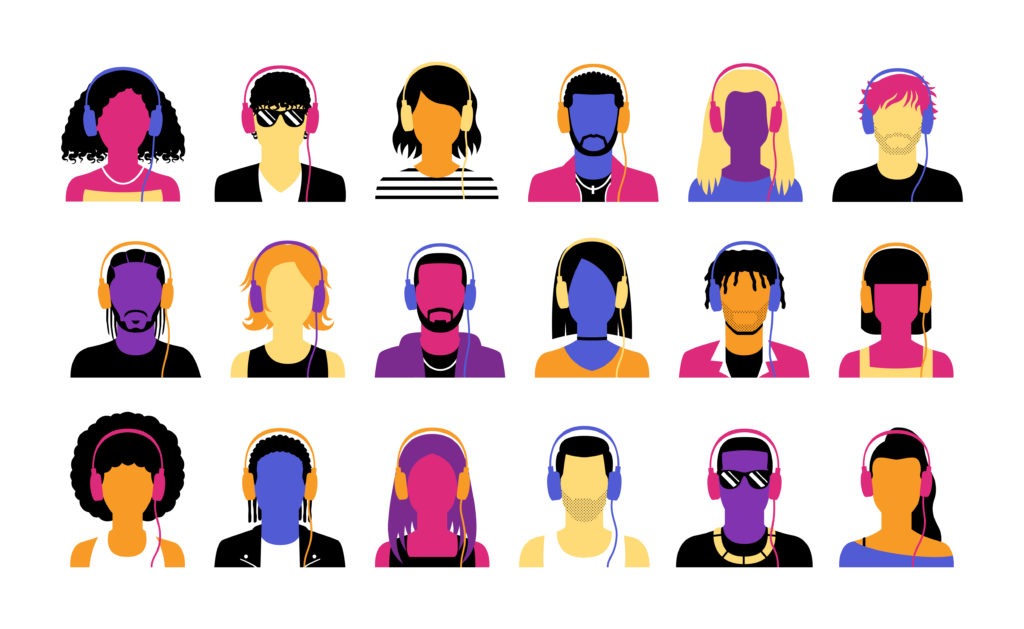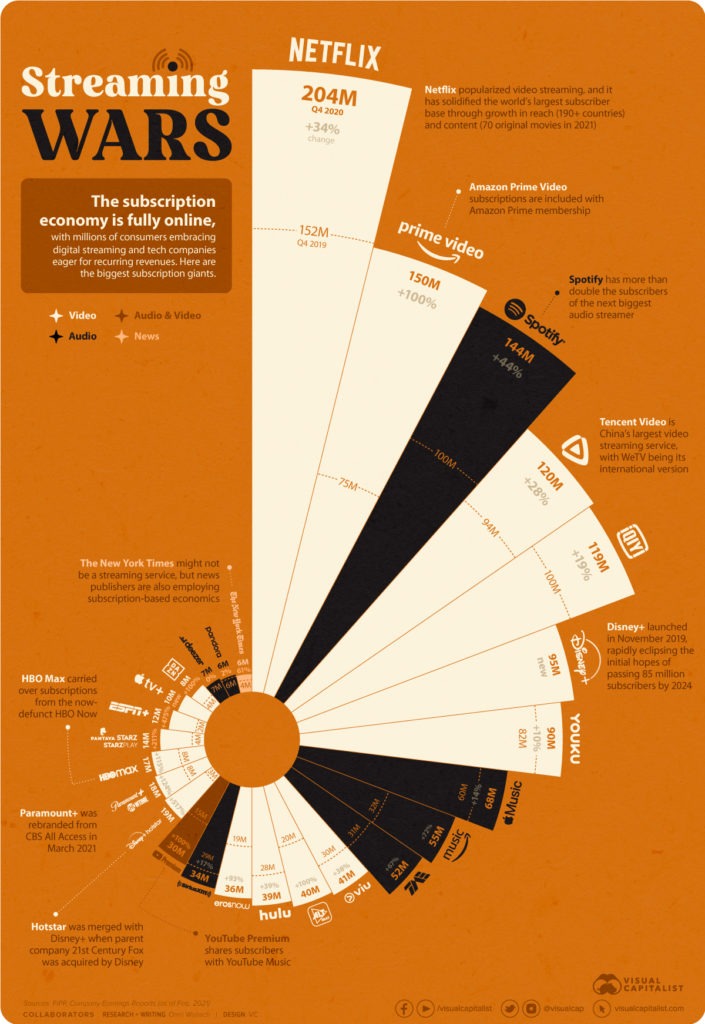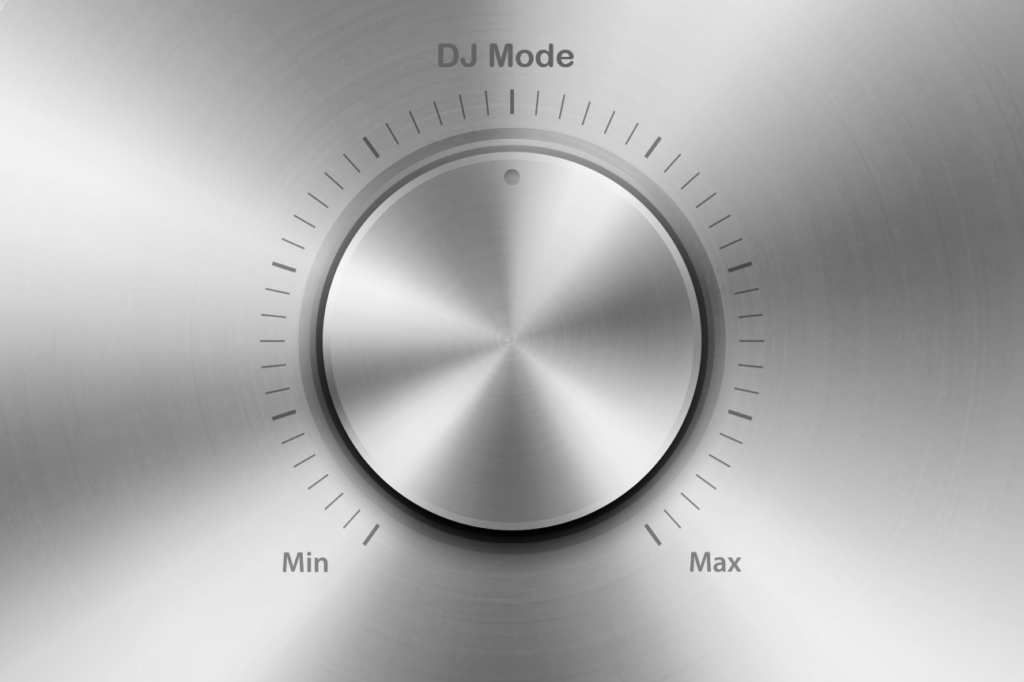
Maybe it was inevitable. With all the high-stakes competition for streaming subscriptions, how do the many different platforms differentiate themselves?
Pricing models, podcast access, streaming quality, the user interface, skip limits, and library size are all variables that might swing a consumer’s decision to Apple, Spotify, Amazon, Pandora, or the many other options.
The streaming economy – video and audio – has exploded in recent years. The global pandemic acted as an accelerant for many platforms, as millions of consumers can attest when they open their credit card statements each month.
The subscription economy isn’t just alive and well. It is powering the media ecosystem, providing a powerful alternative to ad-supported services that include both broadcast radio and television.
To gain an understanding of just how big this ocean of streaming entertainment dollars represent, Visual Capitalist published this handy, mind-boggling chart earlier this year:

Audio streaming services are depicted in black. Deezer and Pandora are at 11 o’clock on this chart, each with under 8 million subscribers. SiriusXM (7 o’clock) notches 34 million paying customers, well behind both Amazon Music and Apple Music (each north of 50 million at 4 o’clock on this chart).
And finally, Spotify. They’re hard to miss (2 o’clock). At 144 million subscribers, they’re more than twice as big as their nearest competitor, Apple Music (68 million). In fact, Apple and Amazon’s streaming services combined still fall well behind the runaway leader, Spotify.
How do Spotify’s would-be competitors gain share? In radio, stations try to gain advantage over one another with tried-and-true tactics: commercial-free segments, cash giveaways, big promotions.
The streaming giants aren’t there – yet. But they are making attempts to stand out, and that’s where personalities have begun to enter the conversation. A favorite DJ, a fun morning team, a provocative talk host are often the key differentiators that influence radio listening – and ultimately, the decision to be loyal to a station and/or a show.
In the streaming world, personality has been something of a conundrum. Slacker placed its chips on DJs early on, but to little avail. Aside from Elon Musk, Slacker’s share of streaming subscribership pales in comparison to the big boys, still under 1 million paying customers.
And for the past few years, Apple Music has enlisted the able assistance of tuned-in, knowledgeable personalities, including Ebro Darden and Zane Lowe, but these efforts to create the ultimate streaming brand have mostly fallen on deaf ears.
Satellite radio has had better luck, carving out a strategy that relies on former hosts of note (Jim Ladd, Pat St. John, Kid Leo, and many others) mashed up with the stars themselves (Little Steven, Tom Petty, Billy Joel, and more every day).
But streaming platforms haven’t gotten it right – yet.
 The pressure to add value to that monthly subscription rate is intense. And beating back all those well-heeled competitors is forcing the big streaming brands to innovate.
The pressure to add value to that monthly subscription rate is intense. And beating back all those well-heeled competitors is forcing the big streaming brands to innovate.
No service has been more active than Spotify. Their research must show there’s a ceiling when it comes to satisfying music lovers with a playlist service. Even though they provide a strong recommendation engine, as well as playlist sharing and features, it may not be enough to fend off the other behemoths like Apple and Amazon, while crushing the bottom feeders.
Across the street, Amazon Music is determined to make headway. Seemingly, everybody subscribes to their Prime service (and Prime Day is coming up!). That entitles consumers of the basic service access to a streaming library comprised of more than 2 million songs.
In a head-to-head comparison, most critics and analysts believe both Amazon Music and Spotify’s streaming platforms are more than worthy.
But given Spotify’s massive lead, Amazon has no choice but to try new things, providing unique features to their value proposition.
Enter “DJ Mode.”

Radio Insight’s Lance Venta reported last week on Amazon’s content-added feature which will appear on several channels, including “All Hits,” “Country Heat,” Rap Rotation,” as well as a special Billie Eilish “takeover” channel.
Here’s a short video about “DJ Mode” that emphasizes storytelling, music trivia, and features that “deepen your connection to the music you love.”
I called up Billie Eilish’s channel on my Amazon Echo device – “Alexa, play the Billie Eilish Takeover.” It’s a behind-the-scenes series of interview snippets with the artist, speaking about specific songs and her artistic process.
For fans, it’s revealing. For those less familiar with Eilish, it’s a nice introduction to the singer and her music. But is it radio? Digital Music News’ Ashley King calls it “radio-like.”
She notes that along with SiriusXM’s recently announced TikTok Radio (which we blogged about last month), it’s a blatant attempt by both Amazon Music and SXM to “add the human touch with DJ mode and human curation.”
Will the other streaming giants enter the personality – that is, DJ – fray? It’s becoming more common for them to amp up added rock star commentary, playlists, and other collaborations designed to set bland music channels apart, while making them more sticky and interesting.
This growing trend has been aided and abetted by podcasting – the audio format that has brought storytelling back to the forefront. While most podcasts are legally limited by their ability to play music, shows about music are popular and abundant.
That brings us full circle to broadcast radio – a medium that has purposefully gravitated away from personality-driven content over the past decade.
The advent of PPM more than a decade ago fueled the myth that on-air talent don’t greatly contribute to ratings; in fact, talk has frequently been positioned as a liability.
It’s a conspiracy theory. Music on the radio still gets ratings, of course. But it’s personalities that generate loyalty, as evidenced by the radio stations using sitting on top of Nielsen rankers. And yet, in round after round of downsizing, talent is often among the first assets to go.
Veteran personality, Tony Magoo, recently confided this on a Facebook post about air talent:
“In a very large market I had a programmer tell me ‘If we’re talking we’re losing.'”
He is far from alone.
As on-air personalities have faced downsizing, as well as increased multi-tasking duties (shows on more than one station, voicetracking, production, and soon, personal appearances), their ability to provide much in the way of enhanced value has become even more limited – and that assumes management and/or ownership perceives benefit from a strong personality presence.
Amazon Music’s move to “DJ Mode” (the name they chose for this feature is no accident) is yet another sign radio broadcasters may be conceding perceptual “real estate” it once owned to digital players.
Radio broadcasters would be wise to focus some of their strategic brainpower on what the streaming giants are doing. It goes without saying that Apple, Spotify, Amazon, and the rest of the field have better metrics and more research and development dollars than every radio station in the U.S. combined. It’s why these companies have hired some of broadcast radio’s best programming minds – Alex Luke, Kevin Weatherly, Alex Tear among them.
Paying attention to the features, the language, the partnerships, and the innovations being made in the audio streaming space isn’t just smart – it’s the due diligence necessary for radio broadcasters to viably compete.
Otherwise, I think we all know how this story will end.
Alexa, is there a local radio station with knowledgeable, entertaining personalities?
Alexa?
Alexa?
- Media And Technology In 2025: Believe It Or Not! - April 18, 2025
- In Radio, You Just Never Know - April 17, 2025
- The Secret To Making A Great Podcast (And Great Radio) - April 16, 2025




Great article. While the streaming giants offer an array of technology advantages, they just haven’t hit on creating the timeless sonic experience that FM radio has created ( though is hard to find these days). That balance of humanity, production brilliance ,minute-by-minute excitement and connection. If and when they hit on that magic combination, in harmony with the digital coolness, they can be explosive. Until then, they strike me as “audio services” rather than 21st century entertainment centers
It is truly amazing how “flat” streaming audio services sound when they’re trying to be “radio-like.’ You are correct, of course. They are hiring enough former radio pros that it’s just a matter of time before somebody gets it right.
I invite you to come have a listen to – NYTheSpirit.com . Total Free Form and knowledgeable DJs. Plus the 24/7 stream.
Oh yeah – I go live every Friday and Saturday for 4 hours. Starting at 8 PM ET
Feel free to do a search on me. Then it will make more sense. 🙂
dm
Yea. I’ve viewed streaming services as folks’ record collections. We have always lost some listening to personal collections. Nobody seems to want to own a physical thing like a CD, or even a download file.
As the services realize that radio pulls some of their listening, of course they’ll look to mitigate that. At the moment, it does feel sterile or flat. I’m sure that’ll change.
We need to be so exciting and engaging. We need to be more sticky.
Thanks again for sharing and thinking. Inspiring.
Chris, I’m glad it resonated for you. Radio has the unique ability to pull off what the biggest companies in the world struggle to accomplish. Making great personality radio that makes people care is not a paint-by-numbers task. Thanks for this feedback.
“And yet, in round after round of downsizing, talent is often among the first assets to go.”
And often that talent KNOWS how to deliver ‘talk/personality’ radio yet the corporate number crunchers don’t care.
It’ll take Amazon or Apple/SXM/whatever to really invest in on-air talent who know how to do a great tease, concise and interesting content that’s relevant or relatable to the listener before TERRESTRIAL finally realizes this. It seems like the companies who understand good personalities are fewer and farther between. They only care about the bottom line and if they don’t, someone above them will and THAT person will force the programmers hand.
I hope Amazon, Apple and the like eat radio’s lunch when it comes to talent.
PS..Can we stop calling radio talent ‘DJs/Disc Jockeys?’ When’s the last time anyone actually touched a ‘disc’ of any sort? I understand it’s an easy shorthand but, come on! *gets down from soapbox*
Moose, hare to argue with any of your points. I used to think Amazon, Apple, and others would eat radio’s lunch (as you say). But now, I wonder whether that will happen, based on their efforts to date. Like you, my hope is that a radio company or two pick up the mantle and becomes the place where radio talent can blossom.
As for the DJs term, I feel your pain. I wouldn’t have gone there for this post if Amazon Music didn’t use it as part of the brand name for their new initiative. And you may be right – that might explain why their product fails to connect. Thanks for this.
Wow, great info Fred! It’ll be interesting to see where this goes..
Thanks again for thought-provoking reading with my breakfast!
I wish it would go somewhere JC. Glad you didn’t have the urge to upchuck that Capt. Crunch while reading today’s blog post. That wouldn’t have made me happy. Thanks for commenting.
I keep telling myself that I should stop commenting on radio related things, that I just don’t care, but I keep coming back, so either I still care (even if just a little bit) or I’m more akin to a dog returning to it’s own vomit. (both undoubtedly are true.)
It seems to me that creating a community on-air or on-stream, is more than just having people talking. It’s about creating intimacy. I personally always hated artist interviews, does anyone really give a damn about what some song someone else wrote for the latest manufactured pop star means to them? It’s about what the song means to the listener that’s important in music radio. So to me something like a Billie Eilish channel with her talking about whatever was is folly.
Will hiring radio’s ‘great programming minds’ fix streaming? Hell, many of them are responsable for the slow motion demise of the broadcast medium we’re in now. Please, by all means jettison them to the streamers.
I AM grateful that folks like you Fred and Lee are still relevant and thinking about this stuff.
John, I have that same “Charlie Brown-Lucy-football” feeling every time I write one of these. We are in lock-step here – the Amazon product just sounds like another plug and play feature, lacking both heart and soul. Appreciate you still taking a shot at the “football” with me.
Good post Fred.
Eilish’s comments made me want to STOP listening. Ha. And I’d swear at least one of the “DJ’s” was Alexa herself; at least it sounded automated. Maybe Gen Z won’t care?
I thought the Eilish piece was perfunctory and not especially personal or engaging. And you’re right – the trivia was read by none other than “Alexa.” Appreciate you chiming in, Tim.
“Apple, Spotify, Amazon, and the rest of the field have better metrics and more research and development dollars than every radio station in the U.S. combined”. With apologies to the Dixie Chicks, there’s your trouble.
Those services don’t even make money, yet they’re investing more in research and development dollars than the entire radio industry – and Spotify doesn’t even have a big corporate parent like Amazon and Apple. It seems that radio has dumbed its personality/local thing down enough that the streamers think they can compete – so how will radio respond with no real development capital?
Does anybody really think that with lots of money and patience that the streamers won’t end up with a better, more attractive personality product than radio, despite some initial missteps? There really isn’t any reason they shouldn’t – particularly because they’re willing to target anyone who will pay them and don’t have to cater to ad agency demos or whims – just subscribers.
Radio’s leaders should really look hard at the kind of threat this is and take note of how the clock is ticking. You have to wonder just what it is they’re thinking.
I like your comment here Bob, One thing.
“they’re willing to target anyone who will pay them and don’t have to cater to ad agency demos or whims – just subscribers.”
Well, that’s what we used to be used to, and IMHO, it was a much better deal with the devil. Personally, I think the corporations were better off when they ‘only’ had to cater to the advertisers. Now they ‘cater’ to the subscribers and we can see where this has gotten us. Virtue signaling on behalf of corporations to placate the most vocal subscribers, and it’s often a small minority of very vocal and sometimes venomous subscribers that steer the content via censorship and arbitrary stances based not on facts or data, but on the current orthodoxy that’s considered the socially acceptable norm. I say, give me the the advertisers to placate any day. With them, if you had a talent that stepped over some line they didn’t like, you could always say, “Well, if you want to pull your spots go ahead, but you do realize that when the ratings come out and they double because of this dust up, the rates will go up too.” Broadcast has the edge there, we don’t have to cave to some rabid cabal of listeners, as long as we have the ratings and stick to our guns, the advertisers will make buys.
Tick tock is right, Bob. Given enough time, there’s no reason why the streamers couldn’t pick some of the best talent out there – in radio & beyond. So, that brings us all the way to Square One (and Two) – the local piece and personality. Doesn’t it come down to serving your city of license with homemade content they can’t get anywhere else – Amazon, Facebook, SXM, Google, Spotify?
Great post and the comments echoed the thoughts that came to mind. There’s nothing spontaneous or compelling . And this was a demo of the best they got? “Alexa, do your DJ voice.”
Ha ha. Yes, it is underwhelming, Paul, and underscores they don’t “get” personality radio.
Wow, so much to say here. It seems to always come back to having “real radio people” who know how to do “real radio.” We know the ratings don’t long-term back up the idea of “less talk/more rock.” People like having a real person keeping them company. But from what I hear turning around, the bean counters to tell the air staff, “Ok, say something–but keep it short and meaningless, just enough so people know you’re there.” That has resulted in some of the most boring, lifeless radio I’ve heard in my life. I’ll take “less talk/more rock” over that any day. No, what’s really needed are those people with that indefinable but very real skill who know how much to say and how much not to say and what’s worth saying and what’s not worth saying. It’s the only thing radio historically has had over all comers.
Meantime, things may be worse than we all realize. I couldn’t resist and just asked Alexa, “is there a local radio station with knowledgeable, entertaining personalities?” Her response: “I couldn’t find any knowledgeable, entertaining personalities.”
Uh-oh. Maybe it’s time to ask radio station corporations and management if they know of any.
Alexa doesn’t no everything, Dave, but that’s not the response I would have hoped for. It continues to come down to who radio broadcasters views as the real competition – the other radio stations up and down the dial – or Amazon, Google, Apple, etc.
Lots of radio people will cheer this article, and hopoe for the return of no-rules radio.
This is, moist of them forgot that when one is doing even freeform radio, the idea is to please the LISTENER, not oneself.
Yes, personality, music knowledge, and thoughtful human curation make a difference. In moderation.
That doesn’t mean blabbing on and on and on is useful. It isn’t. Telling a story still requires brevity and structure.
This is point that’s totally lost on the vast majority of “freeform” proponents and former radio people pinning for “the old days” of their imaginations.